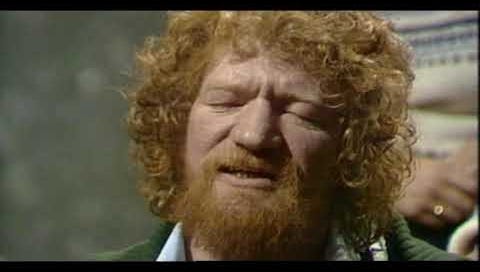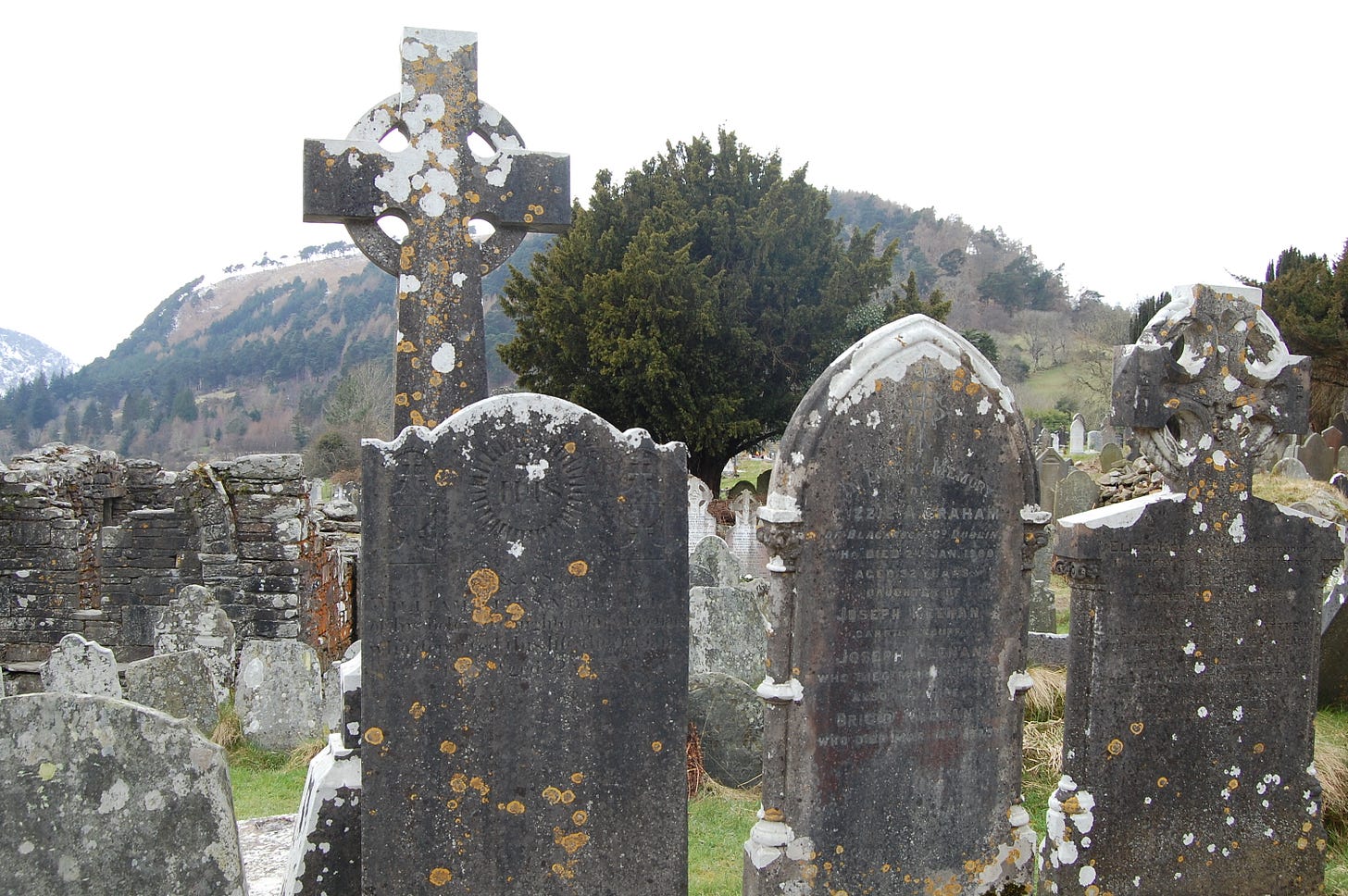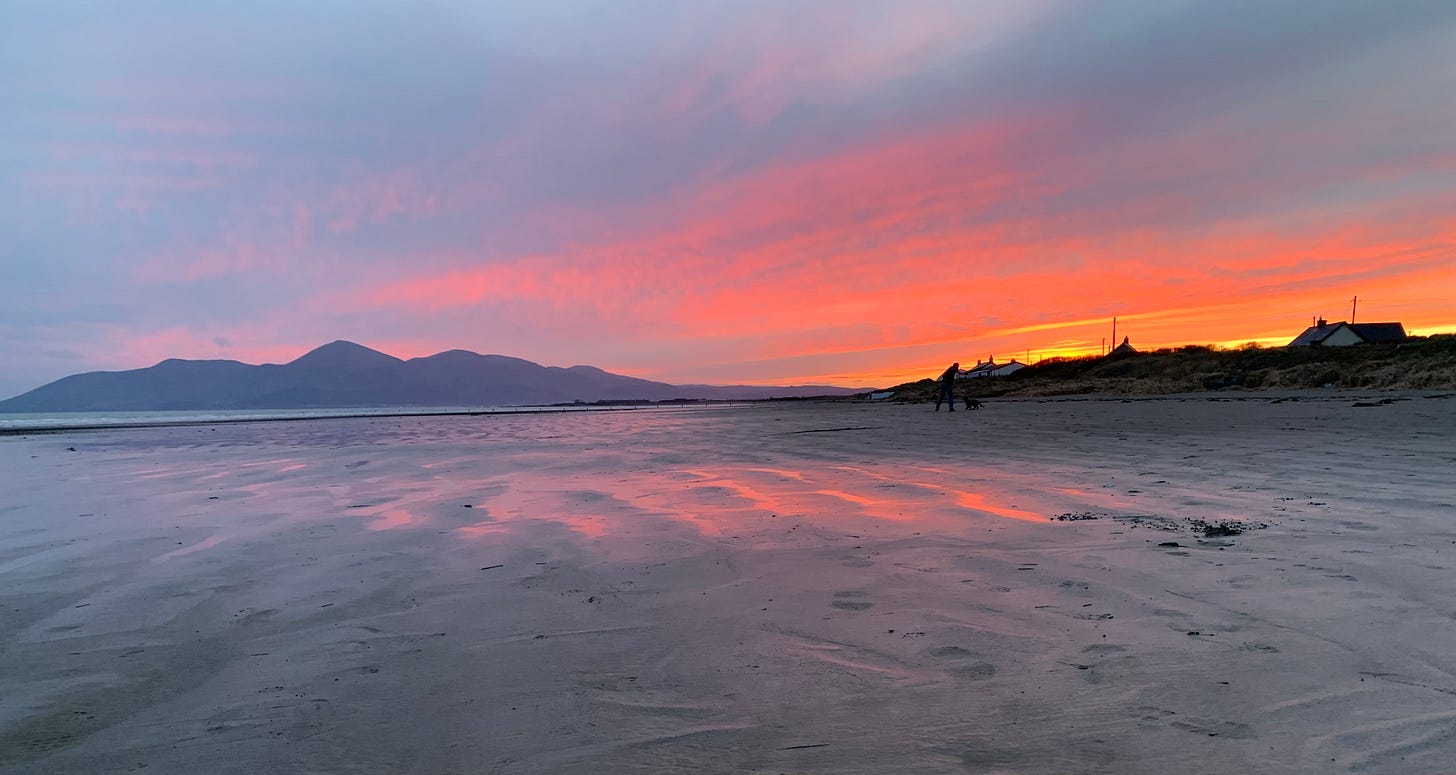Happy St. Patrick’s Day! 🥳☘️
In February I went down to Cork for a few days, as my husband had work down there. In the many years I have lived on the island of Ireland, north and south, I have been to Ireland’s second city a number of times, and it’s always seemed to me like a damp, haunted place. As do all of the other large towns that Ireland calls cities, Galway and Belfast included, and indeed as does Dublin, its capital and the only real city on the whole of this dual-nationality island. The beauty and magic that Ireland is famous for is not found, in my opinion, in its cities. It’s out in the empty, windswept, and wild countryside, where it’s easy to believe that faeries are real and you feel like you are being watched over by the ancients.
Cork city has its charms, a lively food market and well-kept 19th century buildings, but it also suffers from a shabbiness that all post-Celtic Tiger Irish towns of any real size have. Ireland’s cursed history has never been paved over. It’s always somehow visible, even in the height of our modern progressivism. But one of Cork’s largest employers is none other than Apple, Inc. On this visit, trying to get a better feel for the city’s economic prospects, we looked up the city’s Apple campus, in operation for over 40 years, and decided to check it out. We were both looking for some signs of economic life that would make continuing to operate a business there seem like a good idea.
I lived in Dublin for four years in the 1990’s, before the peak of the Celtic Tiger era, and it was pretty grim. And I lived there again in 2012, close to its tech hub development known as Silicon Docks, where Google, Twitter and Facebook have their European headquarters. Begrudgingly, I can say that in some ways these companies have contributed to a vibrancy and cosmopolitanism that Dublin did not have before.
In contrast to Dublin’s tech centre, which is a very walkable development that straddles both the river and a canal, and boasts a large theatre, restaurants, nice delis, bars and water sports, the Cork Apple campus is situated well outside the city centre, high up on a windswept hill that is accessed by only narrow roads with hairpin turns. I drove up, nerves jangling as my Fiat 500 spluttered on the steep inclines. We quickly left the old, narrow city streets and their tiny terraced homes behind and were instead in 1970’s poverty housing hell.
Surrounding the Apple manufacturing facility are none of the cool amenities that urban hipsters and technophiles require. Its only neighbours, in fact, are what looked from the outside like some of the worst urban poverty and desolation I have seen outside of Chicago. I was genuinely shocked. Six thousand people work in this place. But it seems not a single one of them would ever have reason to walk off the site and cross the road, where — I kid you not — bedraggled children were playing unsupervised in the streets and oat milk lattes seemed thin on the ground. It looked more like West Belfast in the 1970’s, minus the Saracen armoured personnel carriers, than the gleaming success story of woke corporate capitalism. But never fear, the company’s press release about the 40th anniversary of its Cork operation, reassures us:
“It doesn’t matter where you’re coming from, or what your language or culture is,” says Porcel, who moved to Cork from Barcelona, Spain. “You’re welcomed right away at Apple. You’re encouraged to be yourself, and to embrace inclusion and diversity.” Porcel is a member of the Cork LGBTQ Diversity Network Association (DNA) and the soon-to-be launched Cork Accessibility DNA, two of Apple’s many DNAs that connect employees with shared interests, backgrounds, and values. He also participates in Apple’s Giving programme, coordinating volunteer engagements for a local charity called Age Action, which provides free technology classes for senior citizens.”
Sure thing, pal.
But I have seen behind the technocracy’s curtain, and shit is dark back there.
Ireland remains an amazing place in many ways. It is totally unique — English speaking but with an innate waywardness quite at odds with repressed Anglo hang-ups so evident in the US and the UK. And that makes so much of Irish culture and Irish people hilarious and charming and down-to-earth. Its many ghosts (the colonial oppression, the crushing poverty, the religious terror meted out on its women and children) cohabit with the famous Irish wit and irreverence and they make for interesting bedfellows. It’s also mind-bogglingly beautiful. And it’s a last bastion of good childrearing in the English speaking world. Here, for the most part, kids are raised in a spirit of common sense, safety and affection.
But it seems to grow more woke by the year, and that is dismaying to me. Being a small and rather insignificant place I don’t see the culture wars that I fled from in the US becoming as furious as they are there. But, as it has done everywhere else, the progressive educational paradigm has manufactured generations of bien-pensant “liberals”, the professional managerial set, who have little to say about the destruction of their own working class and happily go along with small business-crushing pandemic restrictions, but love to virtue signal with rainbows or Palestinian flags (now Ukrainian) in their Twitter bios. I search for signs of that famous Irish rebelliousness, but I don’t see it these days.
What would WB Yeats have to say about that?
Romantic Ireland’s dead and gone
It’s with O’Leary in the grave.
And in the spirit of the old Ireland, which I’m old enough to have vague memories of, enjoy this beautifully sad Patrick Kavanagh poem turned into a hauntingly gorgeous tune by Luke Kelly of the Dubliners.






Yes, Happy St. Patrick's Day. I have never even been to Ireland, but I think that Ireland has influenced my life in profound ways. I grew up in an Irish Catholic neighborhood in the USA in the 1950s and 1960s. Just about every kid in the neighborhood, myself included, went to Catholic schools. There were many excesses in terms of rigidity and legalism and other pathologies, but we did learn some important core truths. Later, I would learn more core truths through actually reading the Bible and focusing more on Jesus Christ and less on man-made religiosity.
These times, they are a changing... 50's and 60's in Pearl River, small houses,1 bathroom, we played in the street 'till the street lights came on...and then some, didn't know we were poor, simple life, church on Sunday [ no open stores on Sunday back then], off to Grandma's and Grandpa's to play with cousins. I'm not so sure what you saw with kids playing in the streets isn't so bad. Now WOKE, you can blame the ACLU and LBJ's Great Society for that.